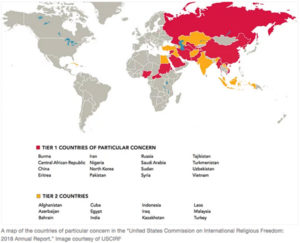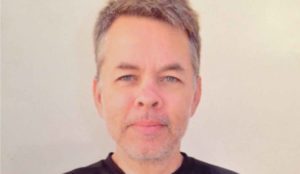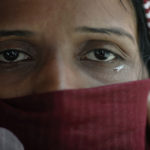WASHINGTON—In its annual report, the U.S. Commission on International Religious Freedom renewed its call for the U.S. State Department to add six nations to its list of the world’s worst religious freedom violators.
Each year, the commission recommends nations it believes should be designated as countries of particular concern under the International Religious Freedom Act. The watchdog commission applies the label to countries whose governments engage in or tolerate systematic, ongoing and egregious violations of religious freedom.
The U.S. State Department issues its own list of countries of particular concern.
Differences with State Department
For the last two years, both the commission and the State Department have agreed on 10 countries—Burma, China, Eritrea, Iran, North Korea, Saudi Arabia, Sudan, Tajikistan, Turkmenistan and Uzbekistan.
 However, the State Department has not included Central African Republic, Nigeria, Pakistan, Russia, Syria and Vietnam, which the commission lists as countries of particular concern.
However, the State Department has not included Central African Republic, Nigeria, Pakistan, Russia, Syria and Vietnam, which the commission lists as countries of particular concern.
“In Nigeria, the government failed to prevent or stop increasing violence along religious lines or hold perpetrators to account,” the report stated. “In Pakistan, the country’s strict blasphemy laws and increased extremist activity further threatened already marginalized minority communities, including Ahmadis, Christians, Hindus, Sikhs and Shi’a Muslims.”
The State Department offers no official explanation why it chooses not to designate some nations as countries of particular concern, Commission Chair Daniel Mark explained in a conference call with reporters.
“More than likely, political considerations serve as a counterweight” to concerns about religious freedom violations, he suggested. For example, he singled out the United States’ relationship with Pakistan as a “sensitive partnership.”
Not a static situation
While the commission’s list of countries of particular concern mirrors the one produced last year, Mark insisted that does not reflect a static global situation regarding violations of religious freedom.
“Sadly, religious freedom conditions deteriorated in many countries in 2017, often due to increasing authoritarianism or under the guise of countering terrorism,” he said. “Yet there is also reason for optimism 20 years after the passage of the International Religious Freedom Act. The importance of this foundational right is appreciated more than ever, and egregious violations are less likely to go unnoticed.”
Mark noted events in Russia—added to the commission’s list of countries of particular concern last year—demonstrated the continuing need for the State Department to “take a very serious look” at it.
“There is a pattern of persecution of small, vulnerable religious minorities,” he said, pointing particularly to Russia’s banning of Jehovah’s Witnesses and its treatment of nontraditional groups such as Scientologists.
Ethnic cleansing and police states
The report noted a variety of other violations, including what the United States and United Nations labeled “ethnic cleansing” of Rohinga Muslims in Myanmar, also known as Burma.

“Villages have been destroyed. Thousands have been brutalized and killed,” said Randel Everett, founding president of the 21st Century Wilberforce Initiative and former executive director of the Baptist General Convention of Texas.
“Christians have not been spared from this nationalist movement, and we know of Baptist pastors who have also been imprisoned. When religious freedom is not available to all, then all are vulnerable.”
The commission report also highlights abuses in China, where it noted “the government created police states in Xinjiang and Tibet to persecute Uighur Muslims and Tibetan Buddhists and continued its brutal treatment of Falun Gong practitioners.”
Christians likewise have been targets of persecution, Everett noted.
“The escalation of restrictions and persecution of people of all faiths by Communist Party leaders in China is the worst since the Cultural Revolution,” he said. “Church buildings are being defaced and even destroyed; pastors and human rights leader are being detained and put in prison, where they are often brutalized and even killed.”
Serious problems in Tier 2 countries
The commission also placed a dozen nations on its second-tier list of countries where violations of religious freedom meet some but not all three elements of the “systematic, ongoing, egregious” test.
The commission designates Afghanistan, Azerbaijan, Bahrain, Cuba, Egypt, India, Indonesia, Iraq, Kazakhstan, Laos, Malaysia and Turkey as Tier 2 countries.
“In Cuba, government officials detained religious leaders and activists who advocated for religious freedom,” the report stated.

Mark particularly cited the continued imprisonment of Andrew Brunson—a North Carolina minister who has been held for a year and a half—in Turkey as “a travesty of justice.”
Officials in Turkey accused Brunson—a minister in the Evangelical Presbyterian Church—of being a member of a terrorist organization and a threat to national security.
Mark characterized Brunson as “a man who had just gone about his business peacefully for more than two decades” before he was “swept up” in a political situation not of his making.
Two commission members who traveled to Turkey visited Brunson late last year, becoming the first Americans other than family and consular staff permitted to see him.
The commission’s report referred to Brunson’s “unjust detention” and said it had “a chilling effect on Christians.”
Non-state actors
The commission also designated ISIS in Iraq and Syria, the Taliban in Afghanistan and al-Shabaab in Somalia as entities of particular concern. The 2016 Frank R. Wolf International Religious Freedom Act created that designation for non-state actors that commit systemic, ongoing and egregious violations of religious freedom.
The act—named for a former U.S. Congressman and current distinguished senior fellow at the 21st Century Wilberforce Initiative—defines a non-state actor as “a non-sovereign entity that exercises significant political power and territorial control; is outside the control of a sovereign government; and often employs violence in pursuit of its objectives.”
Mark called on the Trump Administration to “build on its stated commitments to elevate religious freedom as a priority” in U.S. foreign policy and national security strategy by putting pressure on egregious violators. He also urged the administration to give priority to seeking the release of religious prisoners of conscience.















We seek to connect God’s story and God’s people around the world. To learn more about God’s story, click here.
Send comments and feedback to Eric Black, our editor. For comments to be published, please specify “letter to the editor.” Maximum length for publication is 300 words.